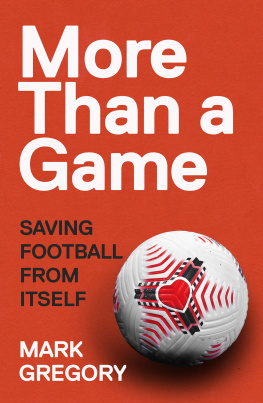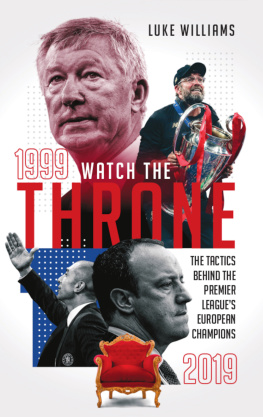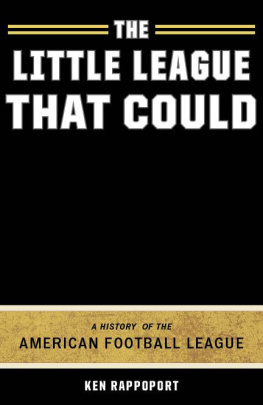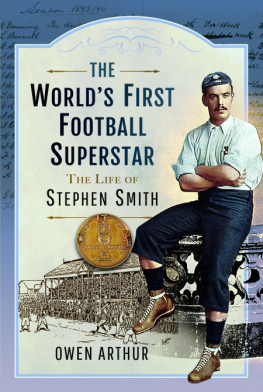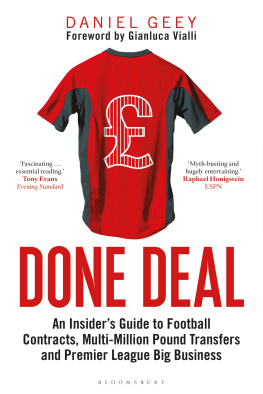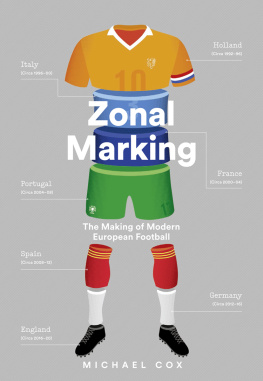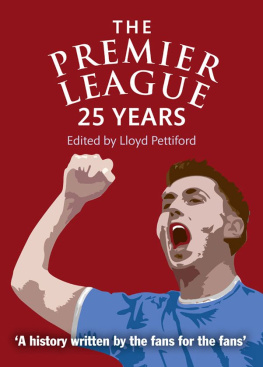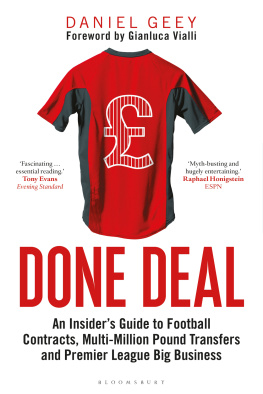

Mark Gregory
MORE THAN A GAME
Saving Football from Itself

CONTENTS
ABOUT THE AUTHOR
Mark Gregory spent the last ten years as Ernst & Youngs chief economist in the UK. In a career spanning over three decades he has advised governments and businesses in over forty countries on economic policy issues, specialising in the liberalisation, regulation and commercialisation of the communications sector. Prior to joining EY he held international roles at IBM and PwC. He founded and led EYs sports economics practice, which has advised the Premier League, the ECB, the Union Cycliste Internationale and the Rugby World Cup on the economic issues affecting their sports. He was recently called as an expert to give evidence on economics and regulation to the Fan-led Review of Football Governance. He is a Director of the Centre for Towns and a member of the UK Governments Trade Advisory Group on investment. He is a lifelong Stoke City supporter.
For Jax, Joe, Ben and Molly the only team that matters.
PREFACE
It is a long way, not just geographically, from the Bet365 Stadium to Wembley. Trudging out of the national stadium on a damp Friday evening after a dull, goalless draw between England and Scotland, I did not expect the journey of this book, which began in the Potteries, would end in northwest London. Yet there I was on 11 July, back in Block 140 watching England play Italy in the Euro 2020 Final. Huge credit to England manager Gareth Southgate, his background staff and the consistently impressive on and off the pitch playing squad for lifting the mood of the nation.
As an emotionally drained Wembley crowd came to terms with England running out of steam, I found myself reflecting how ironic it was that the national team was enjoying success only weeks after the proposed creation of a European Super League had threatened to destroy the core of English football.
It was a journey that began when the FAs desire to improve the performance of the England team led them to back the breakaway Premier League. Four decades later, the Three Lions were succeeding despite the Premier League, not because of it: the fewest national-team-qualified players in a domestic top division in Europe; a manager who had developed his skills primarily in international rather than domestic football; and with many members of the squad having gained valuable experience in the English Football League. And, after years of the Premier League consistently resisting calls for a meaningful mid-season break to allow Englands players to be as rested as those of other countries, it was the rescheduling of fixtures due to Covid-19 that meant all countries turned up in similar shape.
Fantastic experience that it was, in my opinion Euro 2020 was only the second most important activity affecting English football in the summer of 2021. The UK governments Fan-led Review of Football Governance (FLR), which was running in parallel to the tournament, is the main event, offering a once in a generation opportunity to reshape the national mens game. Having given evidence to the panel driving the process, I have no doubt they are committed to understanding what fans want.
Ironically, and in complete contrast to the debate in 1992, there was no mention of the national team in the terms of reference given to the expert panel. And although I do propose ways we could improve the performance of the Three Lions, like the FLR my priority is solving the wider problems of the mens game. (I dont have the detailed knowledge to comment on the womens game and, to be honest, it seems to be doing fine under its own steam.)
However, Englands success at Euro 2020 is important: firstly, it has left us in no doubt as to how crucial fans in stadiums and supporters around the country are; secondly, the hugely impressive manager and players offer a positive contrast to the disastrous performance of the owners and administrators of the national game in recent times we can do better.
In 1990 Nessun Dorma provided the soundtrack for change in football. Today Three Lions captures the positive sentiment towards football. Just as we shouldnt rest on our laurels with the national team, so we must grasp the opportunity offered by the FLR to create the game we want.
Of course, there is no right answer we will all to have to compromise. But, for the first time, fans are at the centre of the debate. Lets bring football home.
1 WHAT IS THE POINT OF STOKE CITY?
The Stoke City boardroom was a sombre place. It was six oclock on Saturday, 16 December 2017, and the home team had just lost 30 to West Ham United in a Premier League relegation six-pointer. Behind me, the West Ham owners, David Gold and David Sullivan, polite and restrained winners, were quietly sipping tea from some of Staffordshires finest bone china. In the far corner, Stoke chairman Peter Coates and his son and vice-chairman John, supporters first and owners second, were deep in conversation. With the club edging ever closer to the relegation trapdoor, their well-known loyalty and patience was being put to the test by growing pressure from supporters to sack manager Mark Hughes.
That it was the former Stoke player Marko Arnautovic who had delivered such a telling blow to Hughess tenure had undoubtedly deepened the gloom hanging over the home clubs owners. The mercurial forward had been almost unplayable on the day, scoring the second goal to put the match out of Stokes reach, a fitting epilogue to the soap opera the player had starred in since the summer. After being appointed manager in the summer of 2013, Hughes had recruited Arnautovic, the players career having stalled at Inter Milan. The Austrian was rejuvenated in the Potteries, his performances earning him a new, lucrative contract in the summer of 2016. A year later, out of the blue, he demanded a transfer.
Every supporter knows how these dramas unfold. The transfer request and the clubs steadfast refusal to accept it occupy the first scene. In the second act, after attempts to change the players mind fail, the club reluctantly allows him to leave. In the finale, the departing player uses social media to thank the club and supporters while the money received is used to buy a new hero.
The story followed the standard plot line and the player was sold to West Ham for a reported 25 million. But events took an unexpected turn Arnautovic ripped up the script and began to improvise. Interviewed shortly after his move, West Hams new star questioned the level of Stoke Citys ambition and claimed this, rather than money, was the reason for his move.
I wanted to join West Ham because, for me, he said, its a bigger club and more ambitious. We can see with the signings that weve made and the players that are already at the club.
Stoke were unhappy. In July 2017 Peter Coates made his feelings clear in the Sun:
We are disappointed in him personally and the people around him. We resurrected his career. Our managers and coaches worked very hard to improve him and made him a name in the game.
Last year we spent so much effort into giving him a long-term contract, and the first thing we get in the summer, he comes back, he wants to leave.
For broadcasters starved of football content in the summer close season, a full-on public spat was manna from heaven. Modern sports radio relies on sensationalism and controversy to engage its audience, so it was no surprise that talkSPORT, the UKs commercial market leader in the genre, took the bait. It quickly put together a programme, What is the point of Stoke City? and, in classic tabloid style, the presenters set out their case: that football is all about winning, and nothing else matters. If mid-table stability in the Premier League was all Stoke Citys owners aspired to then they were in the wrong business.
Next page
